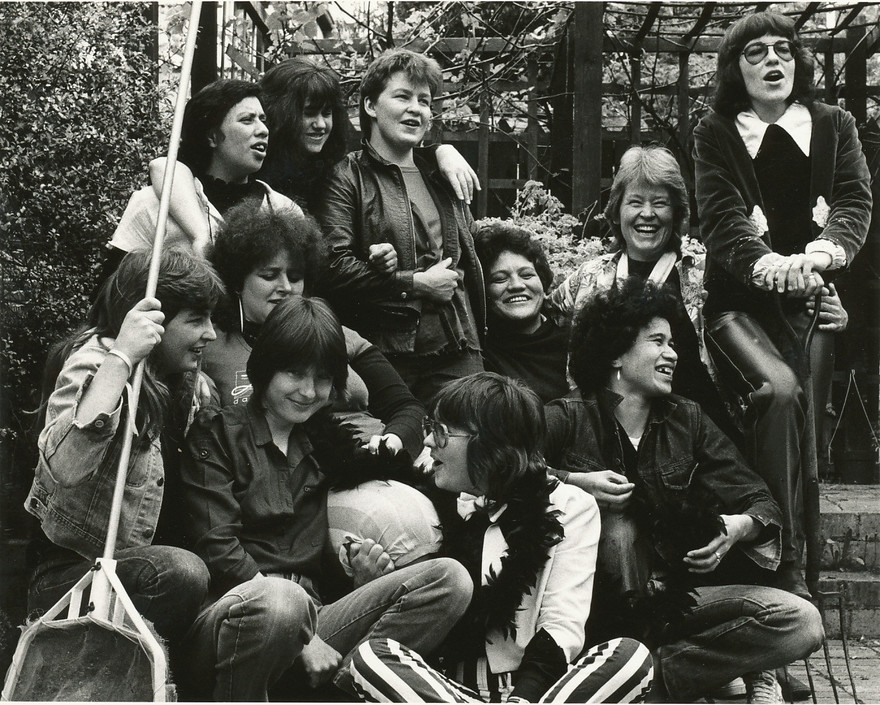
Musicians featured on the Web Women’s Collective album ‘Out of the Corners’ (1982). Back row, from left: Mahinaarangi Tocker, Val Murphy, Lynda Topp, Di Cadwallader, Jess Hawk Oakenstar. Middle: Jools Topp, Hattie St John, Mereana Pitman, Tracy Huirama. Front: Clare Bear, Hilary King. - photo by Gil Hanly
Looking back at the women’s movement in the socially volatile 1970s and 80s, they were comparatively simpler times. Even though feminism was complex – a more militant, separatist faction would emerge – at its core was equality. Equal rights, equal pay, equal opportunity.
As an insight into the culture of the period, music was a male-dominated and male-centric microcosm. New Zealand music was not the industry we know today; women artists struggled for a place.
Certainly, there had been visible, successful, independent women such as Beaver (Bev Morrison) in BLERTA, Shona Laing, Sharon O’Neill, and Jenny Morris. But the fact we can name them is indicative of how few got through or were prepared to dance in the minefield of male approval and expectation, in the boardroom or the bar. The more inclusive punk movement in the late 70s changed the ground.
The nexus of independent women artists, feminism and the post-punk DIY ethos came in 1982 with the recording and release of the album Out of the Corners. It appeared on the newly minted Web Records, with the drawing of a spider web on the label and back cover, “because women weave the world”.
It was the first New Zealand record written, performed, and produced by women and it came out of independent Web Women’s Collective. Out of the Corners included songs by The Topp Twins, Mahinaarangi Tocker (credited as Mahina Tocker), Di Cadwallader, Val Murphy and others.
It’s a measure of how important Out of the Corners was that it sold 500 copies before it was released. The album had grown out of women’s concerts and singers on protest marches or busking, which morphed into the Broadsheet Travelling Roadshow, Broadsheet being the feminist magazine of the day.
The album grew out of women’s concerts and singers on protest marches or busking
The album brought together new and established artists who recorded between midnight and dawn at Auckland’s Harlequin Studios to take advantage of the low rate.
The cover photos – by Biddy Leyland and Gil Hanly, with graphics by singer-songwriter Tracy Huirama, on the album with ‘Sister Wars’ – were of the weary musicians listening to playbacks. The front cover takes a sly poke at the famous dog and logo of the HMV (His Master’s Voice) label.
It’s emblematic of the era in mainstream New Zealand that the New Zealand Herald’s article about the album appeared on its “Mainly Women” page. To be fair to the Herald, it didn’t have entertainment or album review pages at the time, so at least it did cover the groundbreaking release.
Out of the Corners was, unsurprisingly, accorded a full page in Broadsheet in December that year. Cushla Dodson, backgrounding the genesis of the album and the recording process, wrote that the artists of the Roadshow on the album were “people who sent you home feeling good and glad, and often a bit sad, about being a woman”.
She wrote that while some of the night-time sessions “became tense, more were relaxed, even hilarious, all were tiring and often progress seemed unbearably slow”.
But after many months, with support from benefactors and a private loan, the album emerged. “Out of the Corners is much more than a vinyl record,” wrote Dodson, “it is a model for co-operation and creative productivity and a celebration of women’s talent”.
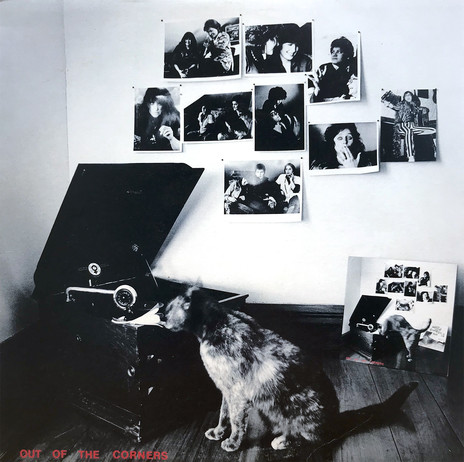
Out of the Corners (Web Women's Collective, 1982). Photo by Biddy Leyland
It was all that and more, and the critics – then, as now, mostly male – agreed. The all-acoustic album received a generally favourable review from Gordon Campbell in the Listener (paired somewhat awkwardly with Grace Jones’s Living My Life album). He wrote that Out of the Corners could “stand on its own feet without props or patronising”.
Colin Hogg in the Auckland Star, praising the sound and songwriting quality, called it “an heroic record” and noted even the established names of the period (Hattie St John, The Topp Twins and Val Murphy) were “still outsiders in an industry that operates within tightly drawn racist and sexist barriers”. He concluded: “a compelling album. Not just by women, for women. There’s music here for anyone with an ear, a brain and a heart”.
In the same column, Hogg also reviewed The Topp Twins’ Go Vinyl EP on which “the Topp Twins [then widely known for their popular busking] take their music straight from the streets of Auckland into the studio”. Again, Hogg was enthusiastic, noting their politics (‘Mr Ronald Reagan’, ‘Bastion Point’), “lickety split rock-and-rolly ‘Good Sisters Gone Bad’ and ‘Untouchables’ ” and “split-hair” harmonies.
Out of the Corners and The Topp Twins’ emerging career were harbingers of what might come from women artists. In 2023, Lynda Topp told AudioCulture that the disc “was, and still is, a ground-breaking album – it was the first time a collective of women came together to create, record and release an album with all the songs being originals, written by women mostly for women, although it was gratifying that the album was well received by New Zealand music lovers as well. At that time, in the early 80s, the recording industry was male-dominated and there was no independent music scene like there is today.”
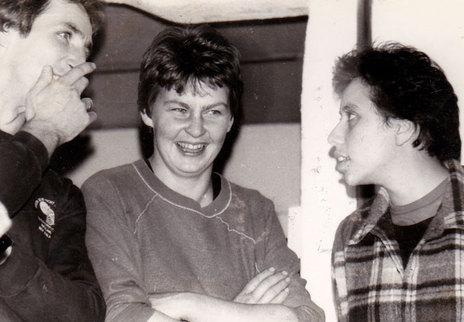
Recording demos for the 'Out of the Corners' album at The Lab studio, Auckland, 1982.
From left: engineer Bill Latimer, Lynda Topp, and Mahinaarangi Tocker - Bill Latimer collection
The album presented diverse voices and perspectives. Tocker’s songs and voice on her originals ‘Arohanui’, ‘Bus Stop Song’ and ‘Songs to Mothers’ are standouts, although Campbell rightly observed she will “probably be dogged by Joni Mitchell comparisons until she’s heartily sick of it, but that’s meant as a compliment to the rich, dark textures and supple slides and twists to her singing here”.
Hogg also made that connection, noting Tocker’s “breathtaking free-range voice – pitched in that jazz-tinged territory somewhere between Joni Mitchell and Phoebe Snow”.
Tocker (Ngāti Raukawa, Ngāti Tūwharetoa, Ngāti Maniapoto) went on to greater things with a series of albums under her own name, notably her 1985 debut Clothesline Conversation and the final album before her death in 2008, The Mongrel in Me
At the time there was considerable focus on singer-songwriter Jess Hawk Oakenstar, who was born and grew up in colonial-era Rhodesia (Zimbabwe). She went through a youthful period as an evangelical Christian then abandoned it, took to the guitar to write, and came to New Zealand in 1979 “with $5 in her pocket”. In Auckland, she performed in bars and hotels (often with Hilary King, also on Corners) and was in the band Red Beryl. She moved to Britain for a while – and when she recognised she was a lesbian, she embraced it.
“Being a lesbian is like being a bandit,” she told Annabelle Woodhouse in Metro for its 1984 article “Rock and Roll Women”. “It’s like living out in the hills. It is really freeing. You are not part of the mainstream although really you are.”
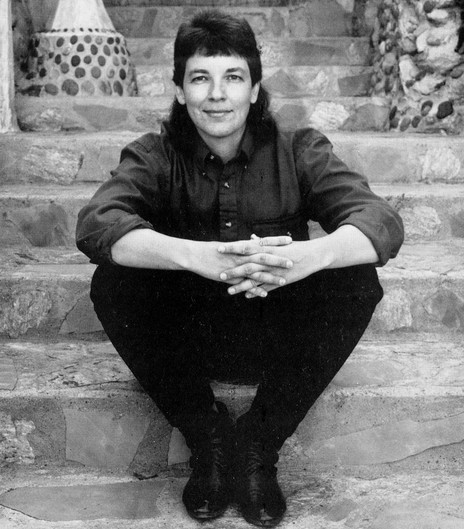
Jess Hawk Oakenstar - publicity photo by Xenia, Linda Wilson Collection, LaBudde Special Collections, UMKC (University of Missouri-Kansas City).
Oakenstar’s two songs on Corners – ‘Gift’ and ‘Waiting on Information’ – are models of economy and self-expression, the former delicate, the latter vibrant folk-rock. In the Listener, Campbell said, “‘Gift’ lines out the struggle to finally accept and maybe even love the adult you’ve become. Both the song and the performance crackle with wit and real passion”. He considered ‘Waiting on Information’ “the only really convincing rock performance on the album” and hoped for more from Oakenstar.
In the song, she sings “see this red hawk go” and a few years after the album, New Zealand lost Oakenstar to the wider world. She performed across the US and Canada for six years (making two cassette albums, later released on CD) and settled in Phoenix, Arizona, where she continued to play and worked in the Scottsdale Public Library for 18 years. She continued performing until shortly before her death at home in April 2022, surrounded by family, her partner Dianne Post and others. Friends from New Zealand, including Hilary King, sent songs and messages in her final days.
Singer/actor Hilary King became a long-time music and drama specialist focusing on students with special needs in Auckland and was awarded the MNZM in 2018 for her services to special education.
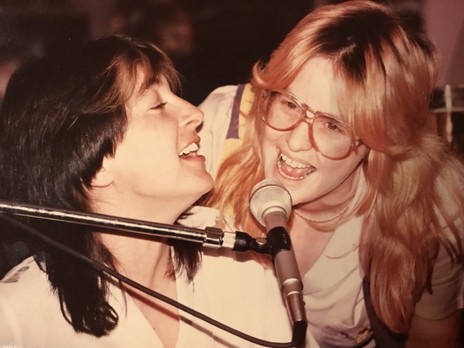
Clare Bear and Hilary King performing in the early 1980s. - Arani Cuthbert Collection
On Out of the Corners, both King and folk-blues singer Val Murphy – whose debut album in 1965, My Way of Singing, included three originals – impress even after all this time. In a 2022 AudioCulture profile, Nick Bollinger said Murphy’s ‘Love Song From Villa 6’ on Corners was “an intimate and deeply empathetic song based on her experiences playing for residents of Kimberley Centre for the Intellectually Disabled”.
Murphy performed live for many years – shifting her interest to blues from folk, an idiom she hinted at in the raw passages of ‘Punk Passion’ on Corners – but no longer does, although she continues to write. There’s very little humour on the album, but King and Murphy enjoy the knockabout ‘Give Us a Durry’ (cigarette).
Hattie St John – who went on to a higher profile and some jazz-blues work with Hattie and the Hot Shots – shows just how promising she was at this early point. After nominations in the Jazz Album of Year section of the music awards, she moved to Europe in the late 90s, settling in Berlin.
If Mereana Pitman’s ‘Marama’ runs dangerously close to Mitchell’s ‘Woodstock’, it takes an increasingly personal path about her young daughter, the future before her, and how “men won’t put her down”.
Hogg counted Pitman as his choice of the singers alongside Tocker saying of her “great sad, earthy tones” on ‘Marama’ that it was “a song to match”.
The Topp Twins are, unusually enough, among the least of Out of the Corners because their songs ‘Graffiti Raiders’ and ‘Paradise’ are both slight and archetypal. The references on ‘Graffiti Raiders’ to “the girls in Ponsonby are doin’ their bit” locks it in its period.
Gordon Campbell was withering in the Listener, but astute given how much acclaim they were enjoying at the time: “So little shading, so cute about the changes in tempo, so monotonous this unison singing: neither track here is quite as infantile as the Reagan song on their EP but right now I’d say the Topp Twins on record need a little less adoration – for their own good.”
Well, the adoration just kept coming and growing: Jools and Lynda Topp became cultural icons and touchstones.
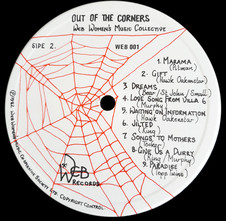
The Web Women's Music Collective – Out of the Corners, side 2 label (1982)
It was in the nature of the album that it would cleave to a feminist ideology which was not just confident and supportive but necessary at a time when rock and pop was a male-dominated domain and women were having to fight for their corners. And, with this album, these artists were coming out of them. And inviting other women to come out with them.
As The Topp Twins sing on the optimistic ‘Paradise’ which closes the 17-song collection – the song starting with laughter and “g’day” – “come on in to paradise where women feel alright ... just do what we like ... walk across that road today, there’s a paradise for you”.
The album – and the culture it celebrated – was life-affirming for many. Among them was Arani Cuthbert, an Auckland student when it came out. Ten years later she became The Topp Twins’ manager. Writing in NZ On Screen in 2023, Cuthbert described the impact the Topps – and the collective that created Out of the Corners – had on her. “One night [after seeing the Topps at the university], a friend and I walked into Just Desserts café (previously the Island of Real, off Airedale Street). Out the back, where bands performed, we were surprised to see it was packed with women, and we quickly realised they were ‘not like other girls’. I later found out it was a fundraiser concert for 1982 album Out of the Corners, the first-ever collection of original songs written and recorded by Kiwi women. It was one of the most memorable, and life-changing, concerts of my life. Incredible artists sang, including Clare Bear, Hilary King, Mahinaarangi Tocker, Mereana Pitman and Tracey Huirama; women as talented as our most celebrated singers today.
“Lynda and Jools hit the stage. As they sang about politics, and being free, I could feel a collective rising up – the room was electric. We were swooning, not just for these sexy singers with a swagger, but for a better world. The promise had been made. That night I witnessed up-close the power music has to bring people together, and create change. For me personally, I recognised my tribe; after that there was no going back.
“But something else remarkable happened. An enormous emotional energy was unleashed that spilled out of the room, onto the streets, and fuelled a decade of protests, and we claimed back our right, as women, to be heard and seen and valued as artists, as anything we wanted to be.”
--
In January 1983 the album was reviewed in Rip It Up, alongside the Topp Twins’ first release. Twenty years later the reviewer, Maryan Street, became a Labour Member of Parliament (2005-2014).
Various Artists
Out of the Corners
Web Records
The Topp Twins Go Vinyl
Dragon’s Egg
By Maryan Street
Carefully produced and mixed, mostly by Di Cadwallader, this first all-women album of original New Zealand songs covers a range of artists and styles. All guitar work is acoustic and extremely competent, with a couple of highlights being Jess Oakenstar’s ‘Waiting on Information’ and Di Cadwallader’s ‘One in a Million’.
The album begins with an unaccompanied solo called ‘Arohanui’ by Mahina Tocker, whose voice is reminiscent of Joni Mitchell’s and just as pure. Raunchy, gutsy numbers come especially from Val Murphy in ‘Punk Passion’ and Val with Hilary King in ‘Give Us a Durry’. The obvious enjoyment that Val and Hilary convey in the latter is enough to make even the most well-worn record reviewer smile, and to have Hilary’s laugh captured for all time is a selling point in itself.
Mereana Pitman’s ‘Marama’ comes over with firm gentleness, quite differently from some live performances I have seen. On record it works well and has a poignant and haunting effect. The Topp Twins contribute two old favourites, ‘Graffiti Raiders’ and ‘Paradise’, with the vitality which is characteristic of them. Tracy Huirama performs a slow, sobering ‘Sister Wars’, which rings true for many women.
In ‘Dreams’, a surrealistic journey produced by Hattie St John and Clare Bear, Hattie’s clear, forceful voice is not matched by Clare’s guitar work, but the song remains with you.
My two favourites are still Hilary King’s ‘Welsh Mountain Christmas Song’ and Jess Oakenstar’s ‘Gift’. The vitality, energy, competence, and clarity of this album make it a first-class release.
Lynda and Jools Topp are a visual as well as an aural experience and having only half of that on record is a little disappointing. However, their characteristic unison singing and close harmonies are as strong as ever and the acoustic, guitar work fits their image and their message well.
Their political statements on this EP are clear, ranging from the most obvious in ‘Mr Ronald Reagan’ through ‘New Waves’ to ‘Dizzy With Love’ and ‘Untouchables’.
For those of you who claim to be concerned about the music scene in New Zealand and who wish to pay more than lip service to New Zealand talent, these two records are landmarks and therefore essential purchases. Watch what the women are doing!
Ngā mihi aroha ki ngā wāhine o Aotearoa.
--